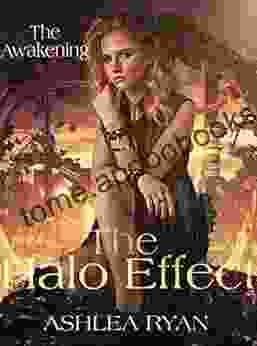The Halo Effect: The Awakening - Exploring the Power and Perils of Perception

In the realm of human cognition, the Halo Effect stands as a powerful phenomenon that shapes our perceptions and influences our decisions. This cognitive bias, first identified in the 1920s, refers to the tendency for our overall impression of an individual to influence our judgments about their specific qualities or behavior.
In the captivating book "The Halo Effect: The Awakening," authors Will Thalheimer and Olina Khazan delve into the fascinating world of this psychological phenomenon. Through a blend of scientific research, real-world examples, and thought-provoking insights, they unravel the intricate mechanisms of the Halo Effect and its profound impact on our lives.
4.8 out of 5
| Language | : | English |
| File size | : | 229 KB |
| Text-to-Speech | : | Enabled |
| Screen Reader | : | Supported |
| Enhanced typesetting | : | Enabled |
| Word Wise | : | Enabled |
| Print length | : | 25 pages |
| Lending | : | Enabled |
The Halo Effect: Mechanisms and Manifestations
The Halo Effect operates through two primary pathways:
The Cognitive Pathway: Our overall impression of a person creates a schema or cognitive framework that shapes our expectations and interpretations of their behavior. The Affective Pathway: Our emotional reactions to an individual's appearance, behavior, or other salient characteristics influence our overall evaluation of them.
The manifestations of the Halo Effect are extensive and can affect various aspects of our lives, including:
Interpersonal Relationships: We tend to view attractive, intelligent, or likeable individuals more favorably and may attribute positive qualities to them that they may not possess. Workplace Dynamics: Managers with a positive overall impression of their employees may be more likely to rate them higher in performance evaluations and offer them promotions. Political Campaigns: Voters may be swayed by the charisma, oratorical skills, or perceived trustworthiness of candidates, leading them to overlook potential flaws or policy differences.
The Perils of the Halo Effect
While the Halo Effect can have positive implications, it can also lead to distorted perceptions and biased decision-making. Some of the perils associated with it include:
False Impressions: When we rely heavily on our overall impression of an individual, we may fail to notice their specific strengths or weaknesses, leading to inaccurate judgments. Confirmation Bias: The Halo Effect can strengthen our existing beliefs and biases, reinforcing our initial impressions and making us resistant to contradictory evidence. Unfair Treatment: If our overall impression of a person is negative, we may treat them unjustly, ignoring their competence or positive qualities.
The Halo Effect in the Classroom
The Halo Effect has a significant impact on educational settings:
Teacher Expectations: Teachers with positive expectations of their students tend to give them higher grades, even if their work is comparable to students with whom they have lower expectations. Student Behavior: Students who are perceived as well-behaved and intelligent are more likely to receive positive attention from teachers, which can motivate them to perform better. Educational Equity: The Halo Effect can contribute to educational inequity, as students from marginalized backgrounds or with physical disabilities may be less likely to benefit from a positive Halo Effect.
Overcoming the Halo Effect
Recognizing the potential pitfalls of the Halo Effect is crucial for making more informed and objective judgments. Here are some strategies to mitigate its influence:
Separate Overall Impressions from Specific Evaluations: Consciously isolate your overall impression of an individual from your judgments about their specific qualities or behavior. Seek Multiple Perspectives: Gather information from various sources to form a more balanced and comprehensive evaluation of an individual. Be Aware of Your Biases: Acknowledge your own cognitive and affective biases and take steps to minimize their impact on your perceptions. Use Objective Criteria: Establish clear and objective criteria for evaluating individuals or situations to reduce the influence of subjective impressions. Practice Mindfulness and Reflection: Engage in ongoing self-reflection and mindfulness to become more aware of your own biases and the role they play in your perceptions.
The Halo Effect is a powerful psychological phenomenon that can shape our perceptions, influence our decisions, and impact various aspects of our lives. Understanding its mechanisms, manifestations, and potential pitfalls is essential for navigating the complexities of human cognition and making more informed and unbiased judgments. Through the insights offered in "The Halo Effect: The Awakening," we can harness the positive aspects of this bias while mitigating its adverse effects, ultimately fostering a more just, equitable, and perceptive society.
4.8 out of 5
| Language | : | English |
| File size | : | 229 KB |
| Text-to-Speech | : | Enabled |
| Screen Reader | : | Supported |
| Enhanced typesetting | : | Enabled |
| Word Wise | : | Enabled |
| Print length | : | 25 pages |
| Lending | : | Enabled |
Do you want to contribute by writing guest posts on this blog?
Please contact us and send us a resume of previous articles that you have written.
 Book
Book Novel
Novel Page
Page Chapter
Chapter Text
Text Story
Story Genre
Genre Reader
Reader Library
Library Paperback
Paperback E-book
E-book Magazine
Magazine Newspaper
Newspaper Paragraph
Paragraph Sentence
Sentence Bookmark
Bookmark Shelf
Shelf Glossary
Glossary Bibliography
Bibliography Foreword
Foreword Preface
Preface Synopsis
Synopsis Annotation
Annotation Footnote
Footnote Manuscript
Manuscript Scroll
Scroll Codex
Codex Tome
Tome Bestseller
Bestseller Classics
Classics Library card
Library card Narrative
Narrative Biography
Biography Autobiography
Autobiography Memoir
Memoir Reference
Reference Encyclopedia
Encyclopedia Wolfram Fleischhauer
Wolfram Fleischhauer Antonio Luciano De Andrade Tosta
Antonio Luciano De Andrade Tosta Artemis Crow
Artemis Crow Howard B Schaffer
Howard B Schaffer Anthony J Comerota
Anthony J Comerota Anthony Frisell
Anthony Frisell Ardith Design
Ardith Design Helen Moss
Helen Moss Audrey Kurth Cronin
Audrey Kurth Cronin Annette Vegas
Annette Vegas Arx Reads
Arx Reads Armand Cabasson
Armand Cabasson Michael Winicott
Michael Winicott Randi Reisfeld
Randi Reisfeld David Marr
David Marr Arno Joubert
Arno Joubert Ashley Clark
Ashley Clark Avner Friedman
Avner Friedman Anthony Stehlin
Anthony Stehlin Nahoko Uehashi
Nahoko Uehashi
Light bulbAdvertise smarter! Our strategic ad space ensures maximum exposure. Reserve your spot today!
 Thomas MannFollow ·4.7k
Thomas MannFollow ·4.7k Osamu DazaiFollow ·3.1k
Osamu DazaiFollow ·3.1k Caleb LongFollow ·3k
Caleb LongFollow ·3k Ralph Waldo EmersonFollow ·19.4k
Ralph Waldo EmersonFollow ·19.4k Aleksandr PushkinFollow ·12.8k
Aleksandr PushkinFollow ·12.8k Salman RushdieFollow ·18.2k
Salman RushdieFollow ·18.2k Jeffrey CoxFollow ·8k
Jeffrey CoxFollow ·8k Ken SimmonsFollow ·7.1k
Ken SimmonsFollow ·7.1k

 Gabriel Garcia Marquez
Gabriel Garcia MarquezLad Dog Baby Professor: The Perfect Book for Your Child
Lad Dog Baby...

 Fredrick Cox
Fredrick CoxAn Excerpt With Fifty Ways To Help Animals Promo Books:...
: Embracing Animal...

 Kelly Blair
Kelly Blair5th Grade US History: Famous US Authors: Fifth Grade...
Step into a captivating world of historical...

 Natsume Sōseki
Natsume SōsekiKull the Destroyer: A Timeless Tale of Sword and Sorcery
The Creation of a...

 Jim Cox
Jim CoxDas Ist Supertoll: Unlocking the Magic of German for Kids
Immersive Learning with...

 Bruce Snyder
Bruce SnyderUnlock the World of Quilting for Kids: Discover "Quick...
Are you ready to embark on a delightful...
4.8 out of 5
| Language | : | English |
| File size | : | 229 KB |
| Text-to-Speech | : | Enabled |
| Screen Reader | : | Supported |
| Enhanced typesetting | : | Enabled |
| Word Wise | : | Enabled |
| Print length | : | 25 pages |
| Lending | : | Enabled |












